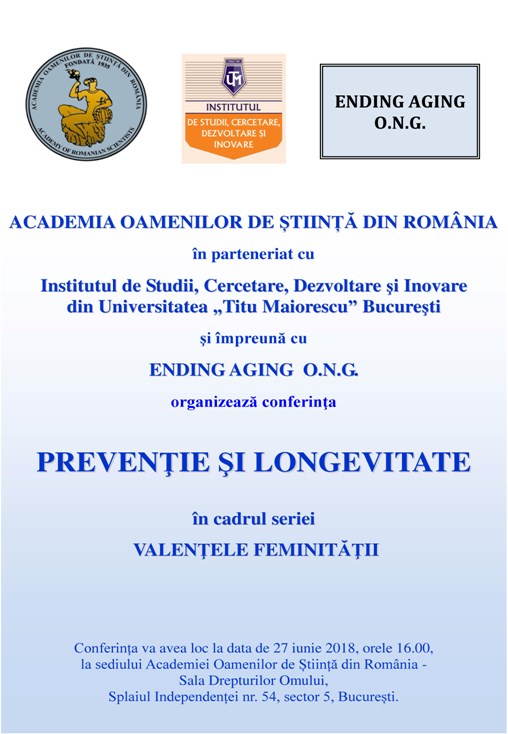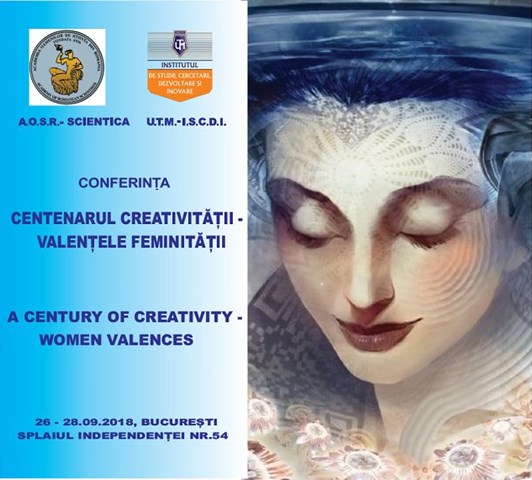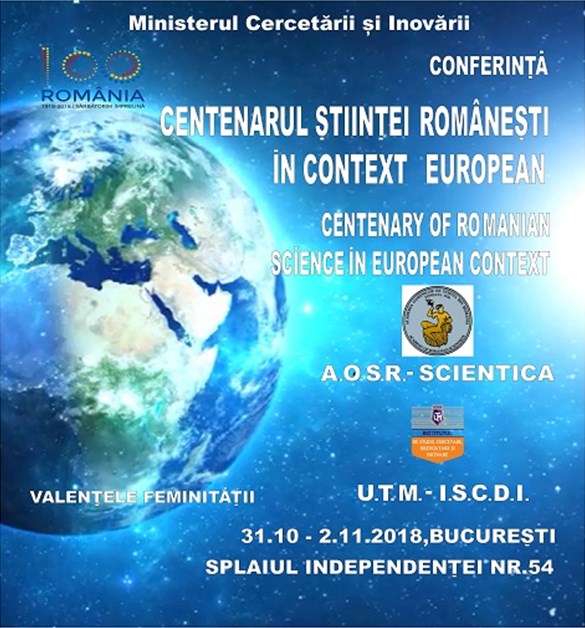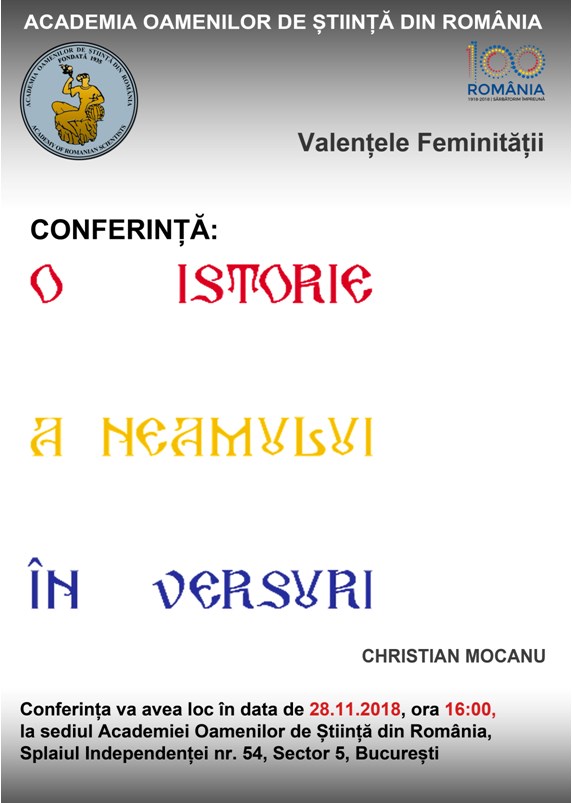VALUES OF WOMEN – 27 June 2018

VALUES OF WOMEN – 26 – 28 September 2018
“CENTENARY OF CREATIVITY – WOMEN’S VALENCES” / “A CENTURY OF CREATIVITY – WOMEN VALENCES”
Type of event: Conference
Event edition: first edition (staging.aosr.ro)
Classification: National conference, with international participation
Evaluation area: According to the guide on “Funding of NACA scientific events”, the theme of the scientific event “CENTENARY OF CREATIVITY – THE VALENCIES OF WOMEN” falls within the priorities supported by the National Strategy for Research, Development and Innovation and is included in the following evaluation areas:
DATE AND PLACE: Date 26 – 28.09.2018; Duration: 3 days
Location: Bucharest, Splaiul Independenceei no. 54, Hall of the Academy of Romanian Scientists;
CONFERENCE PROGRAMME:
CONFERENCE CHAIRMAN
– General (r) prof. univ. dr. Vasile CÂNDEA – Honorary President of the Academy of the People of
Science in Romania, President of SCIENTICA Foundation
VICE-PRESIDENTS
– Prof. dr. eng. Alexandru-Adrian BADEA – President of the Academy of Scientists of
Romania
– Prof. Dr. Doru-Sabin DELION – Vice-President of the Academy of Romanian Scientists
SCIENTIFIC COMMITTEE
– Prof. dr. Titi PARASCHIV – Director of the Institute for Research, Development and Innovation (ISCDI),
Titu Maiorescu University of Bucharest
– Prof. Dr. Natalia CUCU – University of Bucharest
– Academy Professor, Lee COWDEN – Westbrook University, Chairman of the Scientific Advisory
Board and Academy Professor, The Academy of Comprehensive Integrative Medicine, MD Integrative
Medicine & The Texas Medical Board
– Dr. Daniel BEILIN – Chairman of a non-profit research organization: Enderlein Research and
Education Inst, Vienna, Austria
– Dr. Helen WATT, MD – Chairman of ENT Facial Plastic Surgery a nutrition-based approach to healing
and health management, a nutrition-based approach to healing and health management, Arizona, USA
– Dr. Martin LANDENBERGER – Chairman of Akademie für Bioimmuntherapie München, Germany
– Miguel TORIBIO-MATEAS – BSc Hons nutritional Medicine MSc Clinical Neuroscience Advanced
Nutrition, London, UK
– Prof. univ. Dr. Valentin PAU – Titu Maiorescu University of Bucharest
– Prof. dr. Sorin IVAN – Titu Maiorescu University of Bucharest
– Prof. Camelia PAPUC – University of Agronomic Sciences and Veterinary Medicine
– Conf. Ligia ALEXANDRESCU – Romanian-American University
– Lecturer Corina-Nicoleta PREDESCU – University of Agronomic Sciences and Medicine
Veterinary
– Prof. Dott. Med. Leonello MILANI, MD; PhD – Professor Honoris Causa of the Advanced Institute of
Health Studies in Rome, an Italian organization co-operating with the W.H.O. (2000) – Italy
– Andrea ALESSANDRINI – Associate Professor, Department of Physics, Informatics and Mathematics
University of Modena and Reggio Emilia, Researcher at INFM/CNR, Modena, Post-Doc at University of
Modena and Reggio Emilia, Post-Doc at University of Bologna – Italy
– Prof. Dr. med. Claus MUSS – International Society of Applied Preventive Medicine – Germany
– Dr. Meyerhofer INGELHEIM – Klinik für Anästhesiologie, Germany
– Dr David HEFFERON – British Dental Association, Belfast, Ireland
– Dr. Ioana Cristina GÂRLEA – Senior Postdoc, University of Vienna Austria
– Ing. Lăcrămioara Zapciu – Academy of Romanian Scientists
GENERAL SECRETARIAT
– Dr. Eng. Mihai SINDILE – Academy of Romanian Scientists
– Prof. dr. eng. Dan POSTOLEA – Titu Maiorescu University of Bucharest
ORGANISING COMMITTEE
– Ing. Ec. Irina Cristina PASVANTU – Academy of Romanian Scientists
– Ec. Cristina POPESCU – Academy of Romanian Scientists
– Ec. Maria BOTEZATU – Academy of Romanian Scientists
– Cons. Legal Adriana GRIGUȚA – Academy of Romanian Scientists
– Ing. Mihail CĂRUȚAȘU – Academy of Romanian Scientists
– Ing. Bogdan Claudiu PASVANTU – Academy of Romanian Scientists
– Chief of thesis Dr. Corina Nicoleta PREDESCU – University of Agronomic Sciences and Veterinary Medicine Bucharest, Romania
– Lect. univ. dr. Oana-Elena BRÂNDA – Titu Maiorescu University of Bucharest
– Lect. PhD Crînguța-Irina PELEA – Titu Maiorescu University of Bucharest
– Ing. Mariana-Gilda HENTEA – SCIENTICA Foundation
– Ing. Florin GODEANU – SCIENTICA Foundation
PROGRAMME COMMITTEE
– CS I Dr. Dan TIBA – Academy of Romanian Scientists
– Dr. Octaviana MARINCAȘ – Senior Advisor, Ministry of Research and Innovation
– C.S. II dr. phys. Camelia PETRESCU – Titu Maiorescu University of Bucharest
– Prof.Luminița CHIVU – National Institute of Economic Research “C. Kiritescu” – Romanian Academy
– Dr. Simona POP – Elite Commerce Corporation Vienna – Austria
– Cristina GÂRLEA,CS I – Centre for studies and research on agroforestry biodiversity “Acad. David Davidescu” -INCE- Romanian Academy
– Prof. Dr. Ion CUCUI – Valahia University of Targoviste
– Prof. Dr. Florin Emil Nicolae BADEA – Valahia University of Targoviste
– Prof.univ.dr.eng. Manole Stelian SERBULEA – Technical University of Construction Bucharest
– Prof. dr. Mihaela IONESCU – Romania UNESCO Club
– Dr. Corneliu IONESCU, CS I – Institute of National Economy – INCE – Romanian Academy
– Prof. dr. Nicolaie MANOLESCU – corresponding member – Romanian Academy”, OHR Professional Association
– Prof. dr. Ana Maria ZĂGREAN – University of Medicine and Pharmacy “Carol Davila”
– Prof. dr. Luiza SPIRU – University of Medicine and Pharmacy “Carol Davila”
– Prof. dr. Carmen CHIFIRIUC – University of Bucharest
– Prof. dr. Ileana CONSTANTINESCU – University of Medicine and Pharmacy “Carol Davila”
– Prof. dr. Ana Maria OPROIU – University of Medicine and Pharmacy “Carol Davila”
– Prof. dr. Lucian RADU – Polytechnic University of Bucharest
– Prof. dr. Liliana BURLIBAȘA – University of Bucharest
– Prof. dr. Laura MATEESCU – University of Medicine and Pharmacy “Carol Davila”
– Prof. dr. Carmen LITESCU – Polytechnic University of Bucharest
– Dipl. Viorica CUCEREANU – Director of AKADEMOS Magazine, Chisinau, Republic of Moldova
– Dipl. Rodica AVASILOAIE – Director of the Library of the Academy of Music, Theatre and Fine Arts, Chisinau, Republic of Moldova

VALENCIES OF WOMEN – 31 October – 2 November 2018

THE VALUES OF WOMEN – Christian Mocanu – 28 November 2018

The winners of the research projects funded by the Academy of Romanian Scientists competition participated on 18 July 2022 in the Scientific Session presenting the results of the first phase research.
This event facilitated the direct acquaintance of the young researchers by the members of the Scientific Council of the AOSR, who evaluated the results presented. The presentations covered various fields of mathematics, physics, chemistry, biology, medicine, engineering, computer science, sociology, history and were distinguished by proposing concrete solutions to important problems of modern society.
These are attached as presentation files, which can be accessed HERE .
The research results will be translated into scientific papers published in leading international journals and patents.
Article published on dcnews.ro
“Carol I” Central University Library together with the Academy of Romanian Scientists, through the “Constantin Angelescu” Institute for Advanced Interdisciplinary Research (ICAI), the National Institute for Research and Development in Informatics ICI Bucharest, the National Museum of Romanian Literature, the “George Barițiu” County Library of Brasov, the “Carol I” University Foundation and the DigiLib Muscel Association, organised the 14th edition of the “Slove Muscelene” symposium on 14 and 15 July 2022, on the theme “Digital transformation of cultural and educational institutions”.
The symposium “Slove muscelene”, initiated and organized by Prof. univ. dr. eng. Doina Banciu (Vice President of AOSR and Director General of ICAI) since 2009, has been held since its inception in Câmpulung Muscel, with the support of local authorities, and since 2021 in a hybrid format, in the Aula of the Central University Library “Carol I” in Bucharest, doubled this year by the online presence of several personalities from the country and abroad, guests from France, Croatia, Cyprus and Sweden. The cultural-scientific event also means the preservation of the “Slove Muscelene” tradition, started 13 years ago.
The first day took place in the hall of the Central University Library “Carol I”, during which the following spoke on behalf of the organizers: prof. univ. dr. eng. Doina Banciu, prof. univ. dr. Mireille Rădoi, prof. univ. dr. Ioan Cristescu, prof. univ. dr. eng. Dumitru Popescu – Academy of Romanian Scientists.
Prof. dr. eng. Doina Banciu, Director General of ICAI, wanted, as host, moderator and organizer, to encourage specialists, researchers, but also young people entering the multidisciplinary area of digital transformation to pay more attention to the human factor of human resource management in this particularly challenging issue. Digital transformation, in his view, must be understood and applied as a strategic component of transformation management.
The event was also honoured by the presence of officials from key ministries, which are particularly concerned by the phenomenon of digital transformation.
The Minister of Culture, Lucian Romașcanu, welcomed the organisers’ initiative through Ioan Matei, Director of the Office of Written Culture and Contemporary Creation – Ministry of Culture, supporting the development of projects that encourage the acceleration of digitisation of public institutions.
The message of the Minister of Education, Sorin – Mihai Cîmpeanu, was delivered by State Secretary Sorin Ion: Adapting education systems to the digital age has become a major issue on the national and European agenda. This is a political initiative of the European Union to support youth training systems in the Member States. […] The 14th edition of the international symposium “Slove Muscelene” deals closely with the technological evolution of the educational system, hosting debates and avant-garde resolutions that place it on the map of prestigious events.
During the symposium’s debates, also intervened prominent representatives of Romanian state institutions, such as: prof. univ. dr. eng. Adrian Badea, President of AOȘR, Simona Bucura-Oprescu – MP, President of the Committee for Public Administration and Territorial Planning, Romanian Parliament, Dragoș Cristian Vlad – President, Authority for the Digitalization of Romania, prof. univ. dr. eng. Tudor Prisecaru – Secretary of State, Ministry of Research, Innovation and Digitisation, Academician Florin Gheorghe Filip – Romanian Academy, President of the Information Science and Technology Section.
The event had a special symbolism, starting on the National Day of France, enjoying the presence of Mr Mohamed Ketata, Regional Director of the Agence Universitaire de la Francophonie – Central and Eastern Europe, who stressed the importance of these scientific and educational approaches, appreciating the large number of participants.
As in previous years, the event was attended by academics, university professors, researchers, historians, representatives of the Argeș prefecture, as well as numerous library directors, members of the National Commission of Libraries (CNB), along with other guests from France, Croatia, Cyprus, Sweden, who evoked the importance of digital transformation of the institutions they represent.
At this edition, Elena Iagăr and Ion Tița-Nicolescu presented an exhibition of traditional Muscelian costumes, entitled “Marama, an element of Muscelian identity”. There was also the book launch of Alexandra Badea’s book “Points de non-retour [Diagonale du vide], [Quais de Seine], [Thiaroye]”, published by L’Arche, Paris.
Cultural and educational institutions play a key role in promoting knowledge through interaction and dialogue. The library is the space, both physical and virtual, where you can realise that the person who sees the world differently is not just an account on a social network, but a real person. This is where books, electronic resources, employees or other users can help you to pass through a critical filter the information you take in every day. You can get acquainted with different views and, at the same time, learn that behind a relevant analysis there must always be a methodological basis, said Mireille Rădoi, Director General of the Central University Library “Carol I”.
The symposium ended on 15 July with the online support of several scientific papers. The session was moderated by Asst. Dr. Marian Oancea, Head of the Research, Development, Digitization Service of the “Carol I” Central University Library and Dr. Eng. Mihai Dumitrache, Head of the Ro-TLD Department. The papers will be published in a volume with a presentation of the Muscel area and its development prospects.
The Academy of Romanian Scientists, through the Institute for Advanced Interdisciplinary Research “Constantin Angelescu” (ICAI), together with its institutional partners the “Carol I” Central University Library, the National Institute for Research and Development in Informatics ICI Bucharest, the National Museum of Romanian Literature, the “George Barițiu” County Library of Brasov, the “Carol I” University Foundation and the DigiLib Muscel Association organized the 14th edition of the international symposium “Slove muscelene” themed “Digital transformation of institutions in culture and education“.
The symposium “Slove muscelene”, initiated and organized by Prof. univ. dr. eng. Doina Banciu(Vice President of AOSR and Director General of ICAI) in 2009, has been held, since its debut, in Câmpulung Muscel, with the support of local authorities, and since 2021 in hybrid format, in the Aula of the Central University Library “Carol I” in Bucharest, this year benefiting from the online presence of several personalities from the country and abroad, guests from France, Croatia, Cyprus and Sweden.
Digital Transformation, between technology and human resources management
The official opening of the symposium took place on Thursday, 14 July 2022, at 10.00 am, in the Aula of the Central University Library “Carol I” in Bucharest, in the presence of academics, university professors, researchers, historians, directors of major libraries, who stressed the importance of Digital Transformation and analyzed the means to achieve it in Romania.
Ms Doina Banciu, Vice President of AOSR and Director General of ICAI, in her triple role as host, moderator and organiser, wanted to encourage specialists, researchers and younger people entering the multidisciplinary field of Digital Transformation to pay more attention to the management of human resources in this particularly challenging issue. As the human factor plays an important role in the success of digital transformation processes, public administration authorities, as well as the legislative power, together with academia and the private sector, must define a new social pact that places people at the heart of Digital Transformation. Digital Transformation needs to be understood and applied as a strategic component of human factor transformation management in organisations, first and foremost, and then as a technological, ICT component.
During the debates of the symposium “Slove muscelene” participated physically and online Miss Simona Bucura-Oprescu – MP, Chair of the Committee for Public Administration and Spatial Planning, Romanian Parliament, Mr. Dragoș Cristian Vlad – President, Authority for the Digitization of Romania, Prof. univ. dr. ing Tudor Prisecaru – Secretary of State, Ministry of Research, Innovation and Digitization, Academician Florin Gheorghe Filip – Romanian Academy, Prof. univ. dr. ing. Dumitru Popescu – President of the Information Science and Technology Section, Academy of Romanian Scientists, as well as officials from the Prefecture of Argeș, and other leading specialists.
AOSR President, Mr. Adrian Badea appreciated the importance of the initiative of Vice President Doina Banciu, who has dedicated no less than 14 years to a cultural event that started in Câmpulung Muscel and has become today an event with international reverberations, training professionals from several countries passionate about the phenomenon of Digital Transformation. President Badea reinforced the idea that AOSR is at the forefront of these paradigm shifts in the world of science and culture in Romania, as the work of the Academy he coordinates is focused on promoting the latest ideas in these areas of research and innovation. Moreover, AOSR has a special program dedicated to Digital Transformation, and this International Symposium is an integral part of AOSR’s vision of developing in the coming years the acceleration of the digitalization phenomenon in all fields of Romanian society.
D.na conf. Dr Mireille Rădoi, Director of the BCU, said at the opening of the symposium the importance of the topic under discussion, especially from the point of view of libraries that have to face the new institutional paradigms generated by the digital transformation.
The symposium also respected Romania’s traditional relations with France, so on the occasion of the celebration of France’s National Day (July 14) the book “Points de non-retour [Diagonale du vide], [Quais de Seine], [Thiaroye]” by the French author of Romanian origin Alexandra Badea was launched, published by L’Arche Publishing House, Paris, 2019.
The cultural event also included a unique exhibition of traditional Muscelian costumes,
“Marama, an element of Muscel’s identity”
by Elena Iagăr and Ion Tița-Nicolescu, including costumes from the personal collection of Mrs. Simona Bucura-Oprescu.
Officials from the Ministries of Education, Culture, Research, Innovation and Digitisation welcome the International Symposium
The select audience also benefited from the presence of officials from three key ministries particularly concerned by the Digital Transformation phenomenon, namely Mr. State Secretary Sorin Ion – Ministry of Education, Mr. Director Ioan Matei – Ministry of Culture, who also delivered messages to the relevant ministers. Mr. State Secretary Tudor Prisecaru, Ministry of Research, Innovation and Digitisation and President of the Authority for the Digitisation of Romania, Mr. Dragoș Cristian Vlad expressed official views on the role of the institutions he coordinates in harmonising the digital transformation of the public sector in Romania.
Simona Bucura-Oprescu, a Member of Parliament from Muscel, gave a well documented presentation, coupled with a personal-affective involvement in the cultural phenomenon of the Muscel area, who presented the benefits of the Digital Transformation, which must be supported by an adequate legislative framework that the Romanian Parliament will provide in the next period. She stressed that the tradition of the Arges area has always been one of tolerance, of openness towards people, and the national costumes exhibited at the Symposium, some even from her personal collection, show the intellectual richness and strength of character of the local people.
Mister. Secretary of State Sorin Ion declared himself a supporter and promoter of digital transformation in the education system, together with the leadership of the Ministry of Education of which he is a member, evoking the steps taken in the last three years since the acceleration of digitization, caused by the Covid 19 pandemic, in the field of education has created multiple positive experiences in the new direction of the e-learning phenomenon and “remote” education, from anywhere through digital systems.
In turn, Mr. State Secretary Tudor Prisecaru (MCID) evoked the international personalities who have their roots in Câmpulung Muscel, as well as the research elements that must underpin the digital transformation. The Ministry of Research, Innovation and Digitisation, a new structure created not many years ago, could be the policy vector for the development of this new phenomenon of Digital Transformation. Both the Government and the EU have earmarked a number of funds for Digital Transformation, which must be targeted in projects to be submitted by public institutions of national public interest.
The President of the RDA, Mr. Dragoș Cristian Vlad, says that the institution he heads is at the heart of Digital Transformation in all public institutions, including libraries and other cultural institutions, and that the NRRP can create a suitable framework for both broadly useful projects and individual institutions. The new team at the RDA, also formed following recent competitions, has all the assets to ensure that the RDA’s mission is carried out successfully in the coming years, with particular emphasis on libraries being at the heart of the Digital Transformation phenomenon.
Professor Soulla Louca, Director of the Institute For the Future, University of Nicosia, from Cyprus had a very interesting and informationally consistent intervention proving that the current directions in Digital Transformation must also be based on the new strategic directions represented by blockchain, data mining and must pay particular attention to both the phenomenon of artificial intelligence and also that of cyber security, so challenging especially in the last three years.
A first book launch for Romania
The first day of the symposium at BCU also saw the Romanian premiere of three books by French-language author Alexandra Badea. The launch benefited from the presentation of three leading professionals: Prof. Liviu Lucaci, Rector of the University of Theatre and Cinema Arts Bucharest, Prof. Ioan Cristescu, Director of the National Museum of Romanian Literature and cultural diplomat Mohamed Ketata, Regional Director – Agence Universitaire de la Francophonie – Central & Eastern Europe Regional. Mister. Ketata was keen to note that Romanian playwright Alexandra Badea’s trilogy captures and enhances an important element of many French people’s existence, including her family history, the sense of identity. The documentary maker is driven by the desire to recover and as far as possible repair memories. Born in 1980, Alexandra Badea is a Romanian-born French author, director, playwright and actress whose plays, like her first novel, Zone d’amour Prioritaire, are published by L’Arche – a renowned French publishing house created in 1949 by Robert Voisin. The publishing house aims to familiarise a broad public with the fields reserved for specialists, such as psychoanalysis, philosophy, aesthetics and theatre.
UATC’s rector, Liviu Lucaciu, pointed out the personality of the author, whom he has known for at least 20 years through collaborations with Romanian theatres, underlining the director’s presence in the activity of the National Theatre of Bucharest, as well as her successes at international level, in her triple capacity as playwright, scriptwriter and even actor in her own plays.
Following the launch, the director of MNLR, Ioan Cristescu, wanted to point out that such artistic works should also be translated into Romanian, because they are important elements in the cultural links between nations and undoubtedly contribute to tolerance towards other peoples from different geographical areas.
Online conference of scientific communications – the digital dimension of quality content
The 15th of July was exclusively dedicated to scientific communications by the following specialists:
–
Conf. Mireille Rădoi – Academy of Economic Studies of Bucharest, Director General of the Central University Library “Carol I” | The new wave of libraries 2.0;
– Ionuț Petre – National Institute for Research and Development in Informatics ICI Bucharest | Digital transformation of institutions in the context of the information society;
– Prof. univ. Dr.eng. Larisa Ivașcu, Director of the Engineering and Management Research Centre, Polytechnic University of Timisoara | The importance of digitalization in technical universities;
– Monica Barbu, Dragoș Cătălin Barbu, Dragoș Iordache – National Institute for Research and Development in Informatics ICI Bucharest | Standardization and interoperability – key elements of digital transformation;
– Dr. Arja Mäntykanyas – Senior Lecturer University of Borås, Sweden | Unique expertise in digital transformation;
– Radu Marius Boncea, Carmen Rotună – National Institute for Research and Development in Informatics ICI Bucharest | Technologies supporting the future digital economy;
– Alexandru Gheorghiță – National Institute for Research and Development in Computer Science ICI Bucharest | Event-driven distributed computing architectures;
– Ionuț-Eugen Sandu, Mihail Dumitrache – National Institute for Research and Development in Informatics ICI Bucharest | The impact of the digital transformation on internet domains at national and international level;
– Alexandru Georgescu, Carmen Elena Cîrnu – National Institute for Research and Development in Informatics ICI Bucharest | Resilience in the era of cross-border interdependencies;
Prof. Dr. Sorin Ivan, Director “Tribuna Învățământului” | “Tribuna Învățământului” – a space for innovative ideas for education in Romania;
Finally, Dr. Arja Mäntykanyas – Senior Lecturer University of Borås, Sweden professionally highlighted the Swedish model of Digital Transformation in cultural institutions and in the Swedish education system, one of the best performing in Europe and in the world. It focused on new concepts such as Digital Humanities and Multiple Working Places, which have already changed the paradigm in the field of education, but also of distance work through the phenomenon of virtualization, online and video communication.
Mohamed Ketata, Directeur Régional – Agence Universitaire de la Francophonie – Europe Centrale & Orientale Regional, appreciated the importance of the Symposium and declared that his institution supports the efforts of cultural and educational institutions to modernise and cooperate at international level.
The papers presented in the plenary session of the Symposium will be published in a printed volume, with abstracts in English and French, followed by a presentation of the Muscel area and its development prospects.